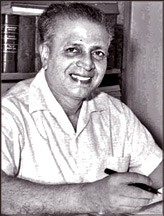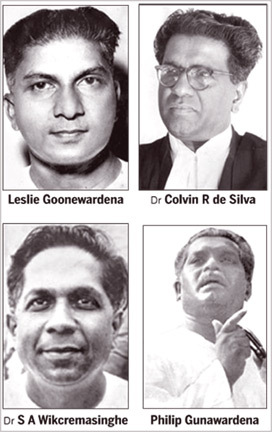|
Dr N M Perera’s 33rd death anniversary :
Doughty fighter and man of principles
Stanley E Abeynayake
|

Dr N M Perera
|
A great son of Sri Lanka, national leader, brilliant economist cum
political scientist, exemplary statesman, above all man of principles
foremost upholder of democratic socialism passed away on August 14,
1979. Born on June 5, 1905 as Nanayakkarapathirage Martin Perera at ‘Thotalanga’,
Grandpass, Colombo 14, his father was a businessman Nanayakkarapathirage
Abraham Perera and mother was Ranwalage Johana Perera. Martin Perera's
father hailed from Wattala-Hendala area and settled down in Grandpass to
commence his business as a trader. His mother was from Sedawatte,
Wellampitiya.
Martin Perera who later came to be known as N M Perera or simply
‘N.M.’ had three brothers and two sisters. He was the fourth child in
the family. Abraham Perera commenced his business from scratch and
prospered to become a shop owner in Grandpass.
After his primary education at St Joseph's English School, Grandpass,
he was admitted to St Thomas’ College then located in Mutwal, Colombo.
There he had to learn inter alia, the classical languages Latin and
Greek. However, he had no liking for the dead languages. His parents
being practising Buddhists, Martin Perera was admitted to Ananda
College, Colombo when the renowned principal P de S Kularatne, Barrister
at Law was making it to be a foremost Buddhist collegiate English medium
school in Sri Lanka, then known as Ceylon. His father wanted to give his
prodigious son a higher education in a Buddhist atmosphere. So, Ananda
College was the sine qua non.
At Ananda, N M Perera took to great delight in learning Social
Science subjects, like, Geography, History and Logic in addition to his
devotion to Mathematics, English Language and Literature. He dropped the
classical dead languages Latin and Greek. At college, he was not merely
a book-worm, but, excelled in sports as well. He became the cricket
captain and was a boy scout too.
 He was also a head prefect at Ananda College. In order to gain
knowledge of the Dhamma, he was under the tutelege of his maternal
uncle, Ven Lunupokune Dhammananda Nayaka Thera - Head monk of the
Vidyalankara Pirivena, Kelaniya. He was also a head prefect at Ananda College. In order to gain
knowledge of the Dhamma, he was under the tutelege of his maternal
uncle, Ven Lunupokune Dhammananda Nayaka Thera - Head monk of the
Vidyalankara Pirivena, Kelaniya.
Lanka Sama Samaja Party
At Ananda he got through the London Matriculation Examination in 1925
and entered the University College, Colombo that prepared students for
the external degree examinations in Arts (B.A.) and Science (B.Sc) of
the London University.
In 1927, he joined the famous London School of Economics having
passed the London Intermediate in Arts with Economics as a subject. By
then, he had also acted in the first Sinhala film Rajakeeya Wickramaya.
He read for the BSC Economics Examination, London and received a degree
with honours in 1929. Thereafter, he sat for the prestigious CCS (Ceylon
Civil Service) examination and got through it. But he was not selected
owing to his anti-imperialist policies and adopting of Marxist
ideologies. In 1931, he obtained his Ph.D in Economics to be followed by
D.Sc (Doctor of Science) in Political Science (1933).
On his return to the motherland, Dr N M Perera applied for the post
of Commissioner of Labour.
That too was a flop as far as government jobs were concerned. On that
occasion, his anti-British attitude was an obstacle for securing such a
post. Then he functioned for sometime as a lecturer in economics at the
University College, Colombo.
On December 16, 1935, the first political party in Sri Lanka - Lanka
Sama Samaja Party - LSSP was formed by Dr N M Perera, Philip Gunawardena,
Dr Colvin R de Silva, Leslie Goonewardena, Dr S A Wikcremasinghe, Edmund
Samarakkody, Jack Kotelawala, Vesudi Gunasekera, B J Fernando, Somaweera
Chandrasiri etc at the inaugural meeting held at Lorenz College, Colombo
10.
The main objective of that first socialist party was to gain full
independence for the country from the British colonial administration.
It was the beginning of the ‘Swaraj’ movement for the emancipation
from the British Empire - where the Sun Never Sets as it was proudly
known.
Its other objective was to put an end to oppression of the working
class and peasants by the Capitalists and feudal carte-conscious land-lordism,
free education, free mid-day meal in Swabhasha government schools,
revised rent laws, administration in both Sinhala and Tamil, work in
minor courts to be in Swabhasha, entries at police stations to be made
in Sinhala or Tamil, revised reasonable salaries for employees in both
the public and private sectors, new labour laws to be enacted, outdated
casteism to be wiped off as social disabilities and so on.
With the formation of the LSSP, all its stalwarts, down to the level
of ‘all Sundry’, members and followers came to be known as comrades -
‘Sahodaraya’ or ‘Sahodari’. Comrade NM contested the second elections to
the State Council in 1936 being the LSSP candidate for the Ruwanwella
seat.
Escape to India
The Ruwanwella seat came into existence under the Donoughmore
Constitution of 1931. At the first State Council Elections held in that
year, a Kandyan ‘Radala’ aristocrat by the name of JH (James Henry)
Meedeniya Adigar was elected. After his unexpected death, his daughter
Adeline Molamure Kumarihamy was returned.
So comrade NM was pitted against that lady at the second elections in
1936. Defeating all the reactionary, feudal, caste conscious forces, he
won that election by a majority of 2,975 votes.
When the Second World War (1939-45) was spreading, the LSSP was
“proscribed as anti-British imperialism - allied forces” and its active
leaders like Comrades NM Perera, Colvin R de Silva, Philip Gunawardena
and Edmund Samarakkody were taken into custody on June 17, 1940 and
detained as political prisoners at the Bogambara Prison, Kandy.
With the aid of a jailor named Solomans and in collaboration with
Robert Gunawardena, younger brother of comrade Philip, the four of them
escaped from prison on April 7, 1942, only two days after the Japanese
air-raid and bombing of Colombo and Trincomalee Harbours on April 5,
1942 - a Sunday morning. To ward off the vigilant eyes of the law
enforcement officers-police, they sailed by boat to India.
In India, Dr N M Perera assumed the name of Dr Vishvanathan and
worked in a bank as an officer. His excellent knowledge of economic,
finance, political science, English law paved the way for the success of
that banking career. The four political detainees were taken into
custody by Police on July 15, 1943 in Ahamadabad, India and sent back to
our country. They tried to escape from prison and were sentenced to six
months rigorous imprisonment and a fine of Rs 100 was also imposed on
each of the four accused persons.
Parliament
After playing the leading role in the historical general strike of
May-June 1947 in which V Kandasamy, a government clerk in the Health
Department was killed by Police shooting on June 5, 1947, Dr NM Perera
had to contest the first parliamentary elections in 1947. He contested
the Ruwanwella seat and was returned as the LSSP Member of Parliament on
September 20, 1947.
He became the first Leader of the Opposition - 1948, in the first
Parliament under the Soulbury constitution. After his election victory
in 1947, he was returned to the same seat at the 1952 and 1956 elections
respectively. In 1956, he became the Leader of the Opposition for the
second time.
It is to his credit and that of the LSSP that he was elected
Municipal Council Member - MMC to represent the Borella Ward and on
August 13, 1954, was chosen as the first Marxist Mayor of Colombo. His
significant contribution to the success of the historical ‘hartal’ of
August 12, 1953 is unforgettable.
He won both the March and July 1960 elections after contesting the
newly created Yatiyantota constituency. He was able to retain
Yatiyantota at both the Parliamentary Elections in 1965 and 1970.
Minister of Finance
He joined the government of Sirimavo Bandaranaike after his 1970
victory and accepted the portfolio of Finance on May 29 of that year. In
framing the new constitution of the Democratic Socialist Republic of Sri
Lanka, his erudite learning, wisdom and experience were eagerly sought
by his second in command Dr Colvin R de Silva, MP, Minister of
Constitutional Affairs and Plantation Industries. When he was the
Minister of Finance, he put an end to corruption in the financial,
commercial and revenue (fiscal) sectors.
He spearheaded the setting up of the State Gem and Jewellery
Corporation, Philatelic Bureau etc. Under the Business Undertakings
Take-over Act, he maintained prominent business ventures.
His progressive measures in the interests of the country were not
compatible with some of his political colleagues. As a result of that
displeasure, he had to resign his portfolio of Finance on September 2,
1975.
His works on ‘Free Education Scheme’ and an ‘Analysis of the 1977
constitution’ are noteworthy.
He secured a string of political victories for 41 years, but, lost
the Yatiyantota electorate at the 1977 parliamentary elections.
Even after his defeat at the 1977 elections, he did not rest on his
laurels. As an advisor, he represented the country at the UNTACD
sessions in 1978. In 1978, he was elected as the President of the
Cricket Council, Sri Lanka.
He became ill due to a gall-bladder complication and breathed his
last at the National Hospital, Colombo on August 14, 1979, aged 74.
Such men are rarely born to a nation.
Of that genuine, honest, highly erudite, exemplary statesman, Dr N M
Perera, a rare gentleman with sterling qualities, I wish to quote the
meaning of verse 96 of the Dhammapada under the title ‘The Worthy’.
"The mind is calm and calm is word and deed of him who is set free by
the perfect knowledge, who is pacified and who is steadfast".
And 'Subhasithaya' Verse 20
“Pin madha puthun siyayak labuwath nisaru
Guna nena belen yuthu puthumaya itha garoo
Eka pun sandin duru wei lowa gana anduroo
Neka tharu rasin elesata noma weya duroo.”
Meaning
It is futile to have a hundred meritless sons.
Only a son endowed with kindness and wisdom is most honoured
Darkness in the world is dispelled by the moonlight of one moon.
Star light from numerous stars could not do likewise. |



